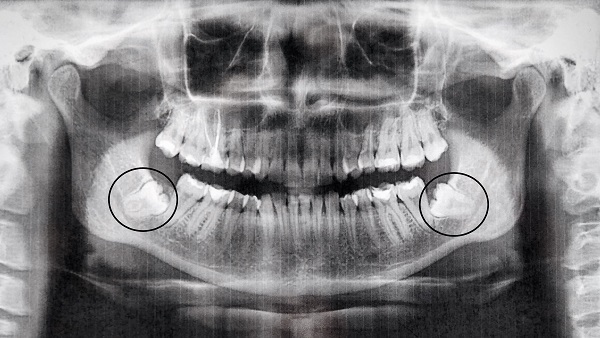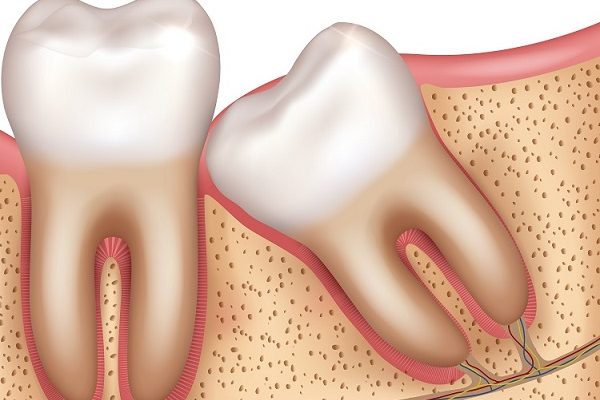Written by the Australian Dental Association, Apr 23, 2022
The third adult molar teeth are commonly called ‘wisdom teeth’. These are usually the last teeth to appear in the mouth, generally around the age of 18-25 years.
Most people will have four wisdom teeth, but they may never or only partially appear in the mouth. Some people will not have them develop at all or may have only one, two or three wisdom teeth.
Wisdom teeth are often impacted, meaning something is stopping them from pushing through into the mouth completely. This may be a lack of space between the second molar tooth and the bone behind.
You may hear of friends or family members having their wisdom teeth removed. This treatment is quite common.
How are wisdom teeth checked?
Your dentist will examine your mouth. If they cannot see your wisdom teeth inside your mouth becuase they are still under the gums, your dentist may ask to take an x-ray. The x-ray lets your dentist to see your wisdom teeth when they are still under the gums. This helps your dentist to see the position of the teeth, the shape of the tooth’s roots and if the wisdom teeth are close to important facial structures, such as nerves. If you are going to have your wisdom teeth removed, the x-ray helps your dentist to plan this treatment.
Do wisdom teeth cause crooked teeth?
When wisdom teeth push into the mouth, they can cause feelings of pressure. Sometimes people worry that the wisdom teeth may cause their other teeth to become crooked. There is currently no evidence that supports this theory.
Tips for cleaning
When wisdom teeth are pushing through the gums and into the mouth, it is important to keep the area clean. Not cleaning the bacteria away can cause the gums surrounding the wisdom teeth that are only partially present in the mouth to become inflamed. This is called pericoronitis.
Ensure your toothbrush reaches all the way back to the wisdom teeth. Sometimes the space in this area is limited. Using a toothbrush with a small brush head can help. Keeping your mouth closed while brushing can give you more space to reach around the cheek sides of the wisdom teeth when brushing.
If you are finding it difficult to brush or there is pain from severely inflamed gums, using an antibacterial mouthwash can help you to care for the wisdom teeth and surrounding gums. But this should not be a long term replacement for brushing.
Impacted wisdom teeth
For many people, wisdom teeth are unable to move from under the gums and into the mouth as the rest of the teeth do. Most people do not have enough space in their jaws for wisdom teeth to easily push through the gums. If there is not enough space, the wisdom tooth will become impacted. This means they are either stuck under the gum or may have been able to only partially break through the gum and a small portion of the tooth can be seen in the mouth.
A wisdom tooth may be sitting at an angle that is causing it to bump into the tooth in front which stops it from moving into the mouth.
Problems caused by impacted wisdom teeth can include infection, pain, cysts, ulcers, food can become stuck and tooth decay can develop on the wisdom tooth or the tooth in front that the wisdom tooth is butting into.
If impacted wisdom teeth are causing problems, your dentist may recommend removing them.

Impacted lower wisdom teeth highlighted by the black circles.
Removing wisdom teeth
There are several reasons why wisdom teeth may be removed.
The teeth are impacted.
They are at risk of developing tooth decay or gum disease.
The gum around the wisdom tooth becomes infected multiple times.
They may be affected by a cyst or tumour.
Wisdom teeth can be removed by your general dentist or a dental specialist, such as an oral surgeon or a maxillofacial surgeon. The teeth can be removed in the dental chair or within a hospital.
Wisdom teeth may be removed under local anaesthesia. The anaesthetic is provided in a similar way to when a dentist makes a tooth numb for a filling.
Other types of anesthetic include local anesthetic in combination with conscious sedation, or general anaesthesia. Conscious sedation is a combination of medicines to help you relax and to block pain during a medical or dental procedure, such as nitrous oxide, commonly known as ‘happy gas’. These anaesthetics can be performed in hospitals and some dental clinics.
Risks and complications
The risks and complications of removing wisdom teeth will be explained prior to any treatment. Possible complications following wisdom tooth removal can include:
Damage to the nerves that travel to and supply feeling to the wisdom teeth and nearby parts of the face. This can cause feelings of numbness or ‘pins and needles’ in the parts of the face and mouth that these nerves give feeling to.
A dry socket.
Swelling and/or infection.
Damage to nearby teeth.
Difficulty opening the mouth, often associated with swelling.
Excessive bleeding.
Pain.
An opening from the mouth to the maxillary sinus (upper wisdom teeth only).
When is the best time to remove them?
Wisdom teeth that are causing problems or at high risk of causing problems in the future are best removed at a younger age. Removing these teeth by around age 25 is easier than doing so at an older age.
If you are experiencing issues with your wisdom teeth, it is best to see your dentist. They can provide you with personalised advice. Visit the ADA’s Find-A-Dentist service to find an ADA member dentist near you.
Will I need to take time off work?
Depending on the difficulty of the treatment, it may be necessary to take a few days off work. After a general anaesthetic, you are unable to drive for 48 hours.
After any tooth extraction, it is best to avoid strenuous exercise.
If your wisdom teeth are bothering you contact us today to arrange an appointment.

